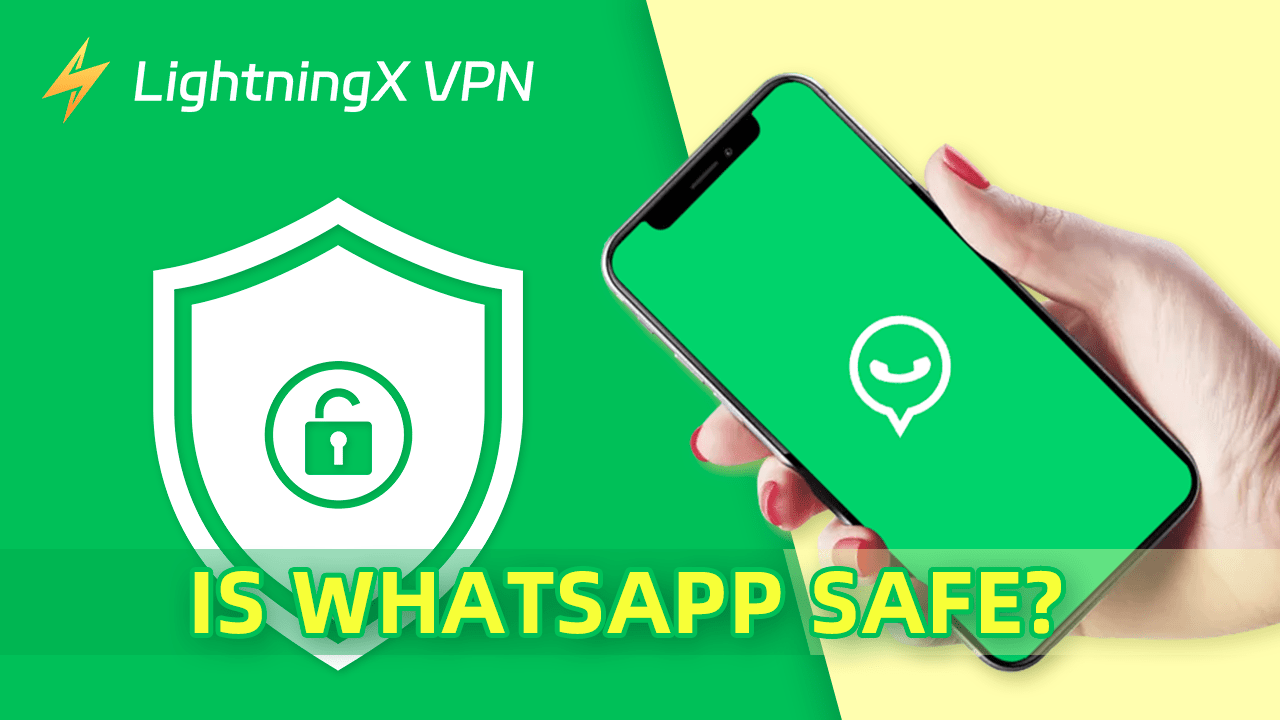If you’re one of the 2 billion people who use WhatsApp, have you ever wondered, “Is WhatsApp safe?”
As WhatsApp’s popularity soars, it’s important to understand the security and privacy of this chat app.
In this WhatsApp review, we’ll take a deep dive into the app’s security features, potential risks, and actionable steps you can take to keep your chats safe.
Whether you’re a parent concerned about your child’s safety, someone exploring online dating, or just curious about how to keep your private photos safe, we’ve got the answers for you.
What is WhatsApp?

WhatsApp is a popular chat app. WhatsApp allows you to send messages, pictures, audio, and video, and it’s more convenient and cheaper than regular text messages. You can:
- Free messaging: Just connect to Wi-Fi and start messaging!
- Group chats: You can chat with multiple friends at the same time.
- Voice messages: If you don’t want to type, you can choose to send voice messages.
- Location sharing: Let your friends know your location with just a tap.
It’s especially popular among teenagers because of these features. It’s owned by Facebook and has over 2 billion users worldwide!
WhatsApp was one of the first apps to offer free internet messaging. It doesn’t use cellular data but relies on Wi-Fi to send and receive messages and calls for free.
If you’re concerned about the security of WhatsApp, read on for our WhatsApp review about security.
Is WhatsApp Safe?
Is WhatsApp safe? Of course! WhatsApp uses end-to-end encryption to protect your data. Essentially, your messages, voice calls, video calls, and photos are encrypted as they travel from your device to your recipient’s device. Only you and the person you’re communicating with can decode them, and not even WhatsApp can access them.
Because of this strong encryption, your messages cannot be intercepted. While in transit, they remain private and can only be read by the intended recipient.
While these points provide a solid overview, there’s more to explore. Next, we’ll examine five aspects of WhatsApp security, from its ability to protect users from hackers to its suitability for children.
1. Is WhatsApp safe for kids?
If you are a parent, it is important to know if WhatsApp is safe for your children. Let’s take a deeper look.
WhatsApp itself is safe. It helps children stay connected with parents and friends. However, like any messaging app, it also comes with some risks:
- Strangers: Children can be targeted by strangers with malicious intentions.
- Cyberbullying: Bullying can also happen online, and WhatsApp is no exception.
- Scams: There are various WhatsApp scams that can trick children into sharing personal information or money.
According to WhatsApp’s terms of service, users must be 13 years of age or older (or older, depending on your country) to use the app. Therefore, it is important to follow these guidelines.
And WhatsApp does not have specific parental controls, so if you are wondering if your child is safe using WhatsApp, here are some tips:
- Talk to your children: Ensure they understand the potential risks and encourage them to come to you if they encounter anything suspicious.
- Use WhatsApp Web: Children can use WhatsApp on family computers through the web interface. This makes it easier for you to monitor their activities.
In conclusion, while WhatsApp is secure in terms of encryption, parents should be wary of their children’s communications with strangers on the internet.
2. Is WhatsApp safe for online dating?
If you’re into online dating and wondering if it’s safe to chat with your date on WhatsApp, read on.
Generally, it’s best to keep your chats on dating apps until you can trust the other person. Dating apps have built-in features to help you stay safe, such as blocking suspicious links and allowing you to easily report or block users.
When you switch your online date to WhatsApp, your phone number becomes visible, and the other person can see your online status and some private information.
Therefore, we recommend switching to WhatsApp only when you’re sure the other person is trustworthy. Remember to hide your online status and private information on WhatsApp.
While WhatsApp is secure in terms of encryption, you should always be vigilant when dating online.
3. Is WhatsApp safe for sending private photos?
Wondering if it’s safe to send private photos on WhatsApp?
The good news is that WhatsApp uses end-to-end encryption. This means your photos become secret codes as they travel from your phone to the recipient’s phone. No one else can see them, not even WhatsApp.
You can also adjust your settings to prevent photos from being saved via screenshots, adding an extra layer of privacy.
However, sending private photos is risky. Even if WhatsApp can keep your photos private, it doesn’t mean others can’t see them.
4. Is WhatsApp safe from the government?
Chatting with friends, family, or strangers on WhatsApp is not monitored. What about the government?
Is WhatsApp safe from government snooping?
WhatsApp uses end-to-end encryption. However, the government can still request data from WhatsApp through legal means such as a search warrant or subpoena.
While WhatsApp cannot provide the content of your messages due to encryption, it may have to share other information such as metadata (who you are talking to, when you are talking, etc.).
5. Is WhatsApp safe from hackers?
Is WhatsApp safe from hackers? Yes!
Thanks to the end-to-end encryption and two-step verification options.
However, hackers can still log into your account by cracking your password.
In addition to this, to make your account more secure, enable two-step verification to increase its security.
What Security Risks WhatsApp Have?
In the previous section, we answered the question of whether WhatsApp is safe. So, are there any security risks with WhatsApp? Clearly, there are.
1. Malware issues
- 2019: Hackers exploited vulnerabilities to install malware on user devices.
- 2022: There is a vulnerability that could allow hackers to infect devices through video calls.
2. Phishing scams
- Fake links: Hackers send links that pretend to be from trusted contacts.
- Infected devices: Clicking these links can install malware on your device.
- Hijacked accounts: Sometimes, hackers even steal your friends or family’s accounts to trick you.
3. Privacy issues
- Data sharing: In 2021, WhatsApp changed its privacy policy to share more user data with Meta. Including your phone number, transaction data, device information, etc.
- Monetization: Since WhatsApp is free, your data is likely to be used for targeted advertising.
These are the security risks of WhatsApp. While these risks may make you feel uneasy when using WhatsApp, there are things you can do to stay safe.
How to Keep Safe on WhatsApp?
If you have already set up WhatsApp according to the above, is there anything else you need to do? Of course, there are still some ways to protect your privacy when using WhatsApp.
1. Use chat locks
Protect specific chats with a password. You need to unlock them with your device’s authentication (such as fingerprint or PIN) to read or send messages.
2. Delete messages regularly
Set messages to disappear after 24 hours, 7 days, or 90 days.
Media files disappear after the recipient opens them once, and screenshots are not allowed.
3. Use a VPN
VPN can add an extra layer of security by masking your Internet activity.
Why do you need a VPN when using WhatsApp?
- VPNs can hide your real IP address, making your online activities untraceable.
- VPNs encrypt all your network traffic, including your messages and call logs on WhatsApp.
- When using public Wi-Fi, VPNs can prevent other users connected to the same network from stealing your data.
- Some countries may restrict or monitor the use of WhatsApp, and using a VPN can bypass these restrictions.

We recommend LightningX VPN, which has strong encryption technology and a strict no-logging policy to protect your privacy to the greatest extent. Download LightningX VPN to get a 7-day free trial.
At this point, all your WhatsApp traffic will be transmitted through the encrypted VPN tunnel, ensuring a more secure WhatsApp experience.
How to Set Up WhatsApp Securely?
How can you make WhatsApp more secure? Here are some simple steps to enhance your security and privacy on the app.
- Use a strong password
Ensure your password is at least 10 characters long and contains letters, numbers, and symbols. Don’t use common words or phrases.
- Enable two-step verification
- Open WhatsApp settings.
- Tap “Account” and select “Two-step verification”.
- Follow the prompts to create a numeric PIN.
- Don’t click on links in messages
Confirm the link’s security, even if the message is from someone you know. If in doubt, don’t click on the link. Consider installing a VPN on your device to increase its security.
- Turn on end-to-end encrypted backup
- Open WhatsApp settings.
- Select “Chat backup” and “End-to-end encrypted backup”.
- Follow the prompts to create a password or key, then tap “Create”.
- Adjust privacy settings
- Go to your device settings.
- Change settings like read receipts and who can see your last seen status.
- Limit who can see your profile photo, messages, status updates, and last seen status.
- Enable Touch ID or Face ID
- Open Settings.
- Select “Screen lock.”
- Enable “Require Touch ID” or “Require Face ID.”
By following these steps, you’ll make your WhatsApp more secure.
Final Thought
So, is WhatsApp safe? Yes.
WhatsApp has strong end-to-end encryption to keep your messages, calls, and photos safe, but there are still some security risks to be aware of.
By following the steps outlined in this WhatsApp review:
- Use a strong password
- Enable two-step verification
- Use LightningX VPN
You can significantly enhance the security and privacy of using WhatsApp.
















